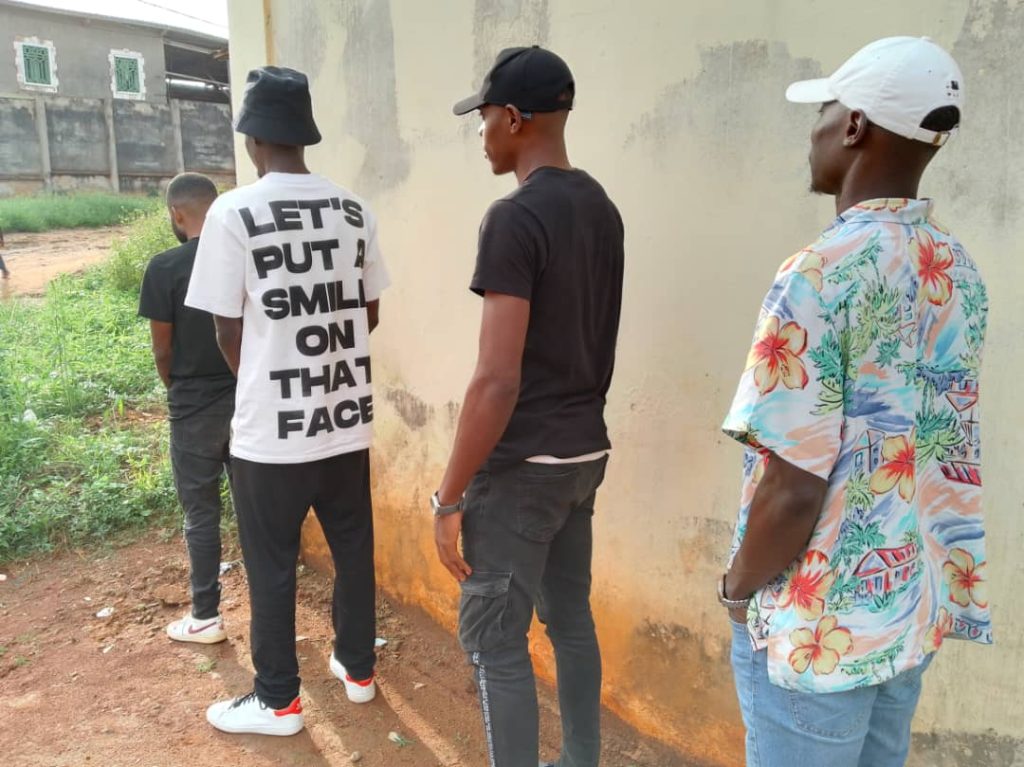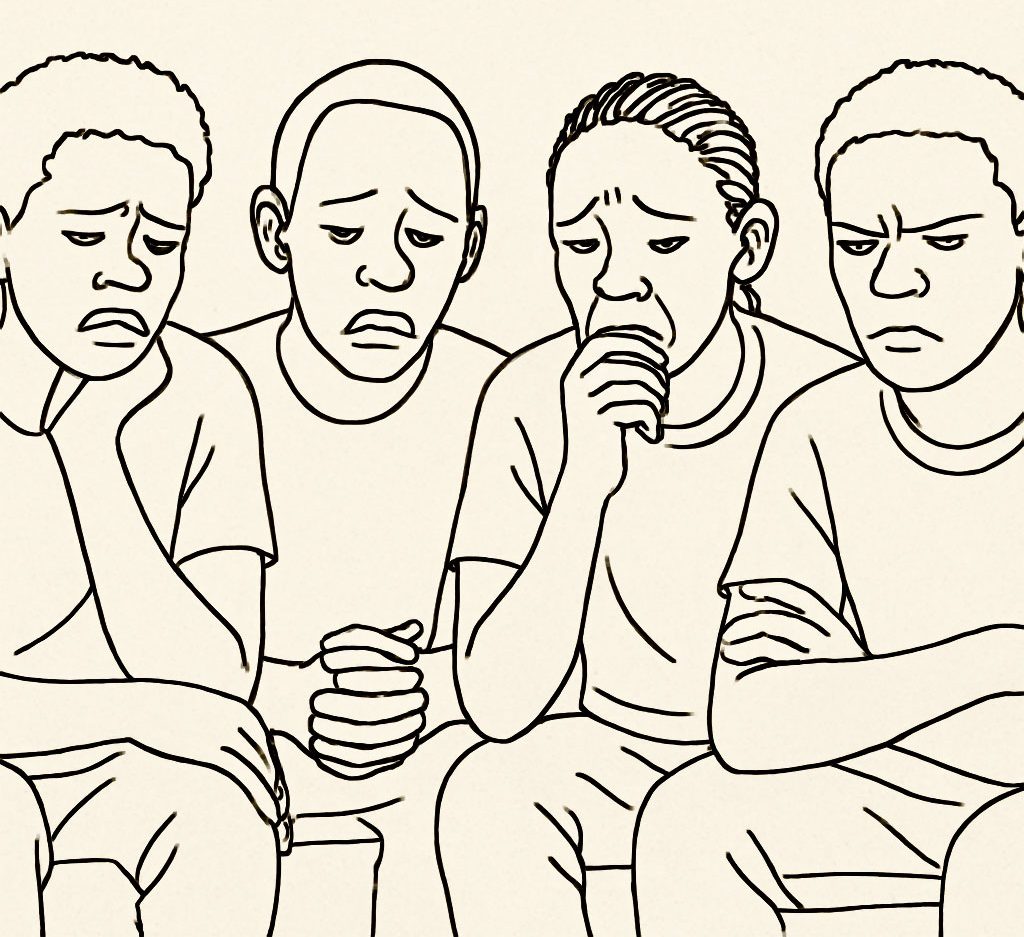We freed four Muslim men imprisoned when their imam called them gay
Reporters for Erasing 76 Crimes are LGBTQ rights activists
Now please help us replenish funds supporting our advocacy journalism.

For nearly nine months, four young Muslim men were detained at Maroua Central Prison in the far north of Cameroon because their local imam thought they might be gay.
They were arrested Jan. 12, after the imam told police that the men had been caught watching a homosexual video at home. Mosque worshippers reinforced the suspicions, fueling a process based on rumors and prejudice.
They were imprisoned on suspicion of homosexuality, though Cameroon’s anti-gay law doesn’t make same-sex attraction a crime. On paper but not in reality, only same-sex intercourse is outlawed, with a punishment of up to five years in prison.
In the spring, Project Not Alone included them in its list of 12 innocent LGBTQ victims of African homophobia that the project resolved to set free this year, with help from generous readers.
We accomplished that goal on Oct. 6, after the four spent nearly nine months in custody without trial. On that date, they were set free, ending the threat of a two-year prison sentence that was planned for them. Their release marks a small, fragile but real victory against the criminalization of homosexuality in Cameroon.
Thanks to attorney Roger Galima, a volunteer lawyer close to one of them, they benefited from a rigorous defense in the face of religious and social pressure. Galima worked with Project Not Alone to secure their release.
The cost of that work was U.S.$1,705, covering court expenses, negotiations with the prosecutor, paying their fine and providing limited psychosocial support during their detention.
Project Not Alone is a donor-supported initiative of the Erasing 76 Crimes news site and its financial sponsor, the St. Paul’s Foundation for International Reconciliation, a U.S.-based charity.

The four men were identified by pseudonyms for their safety — Sabir, 24; Dom, 23; Yabby, 25; and Sol, 23.
All were unemployed and sharing a family home at the time of their arrest.
Their daily life in prison was marked by isolation, insecurity, and fear. They received only a few visits from friends. Their families, fearing social and religious rejection, kept their distance. Inside the prison, conditions were harsh. They had to endure overcrowding, lack of privacy, insufficient food, and a climate of stigma reinforced by the accusations against them.
Four lives on hold
Sabir: “We were locked up like animals. I didn’t even understand why we were treated like criminals,” Sabir said.
Typically discreet about watching online videos, Sabir experienced his imprisonment as a profound humiliation. But he remains hopeful for a future where he can live without fear.
Dom: “What hurt me most was that my own family never came. I understood that in this country, being suspected is enough to be abandoned.”
Sociable and dreamy, Dom tried to keep the group’s spirits up, despite the prison’s unsanitary conditions and accusing stares from guards and other prisoners.
Yabby: “There was no place to sleep. We shared a corner of the floor, with the cockroaches and the insults. But I never stopped believing we would get out.”
Protective and thoughtful, Yabby often acted as a mediator in the prison, while bearing the brunt of others’ social rejection of the group.
Sol: “I cried the first few nights. Not because I was afraid, but because I felt dirty, as if I had done something wrong.”
Lively and passionate about music, Sol lost that enthusiasm in prison, but clings to the idea of a better future.
Expressions of gratitude
Upon their release, the young men expressed their gratitude to Project Not Alone and to the readers who supported them with donations.
“Without 76 Crimes, we would still be there. They treated us like humans, not monsters,” Sabir said.
“The project gave us a voice, a lawyer, and above all, a chance. Thank you to everyone who believed in us.” — Dom
“We thought no one would come. But they came. They listened. They freed us.” — Yabby
And now? Fragile but vibrant prospects
Since their release, the four young men have been trying to rebuild their lives, away from accusing eyes. They left Maroua to seek safety, each in a different city.
• Sabir wants to train in computer graphics: “I want to create, to tell stories differently,” he said.
• Dom hopes to join a mechanics shop: “I’ve always loved repairing things, now I want to rebuild myself.”
• Yabby plans to become a community mediator: “If I can help others avoid going through what we went through, I will.”
• Sol dreams of returning to a former passion of his — dance: “I want my body to speak, to say that we’re still here,” he said.
They know the road will be long, but they’ll support each other as they move ahead, free to pursue their hopes and dreams.
Funds still needed
Project Not Alone has completed its fundraising for 2025 and soon will celebrate the release of the year’s entire roster of 12 innocent LGBT prisoners, but our focus on fundraising from May through September has left Erasing 76 Crimes with only a little remaining cash to pay for its fundamental work of publishing articles about the human toll of 65+ countries’ anti-gay laws and the struggle to repeal them.
Without that work, Project Not Alone wouldn’t be possible.
If you’re in a position to help us pay our activist reporters, please consider making a generous donation. The St. Paul’s Foundation for International Reconciliation is a tax-exempt charity, so donations are U.S. tax-deductible via:
- PayPal (for U.S. dollar contributions). For other currencies, send PayPal donations to stpaulsfdr@gmail.com
- Alternatively, you could send a check to St. Paul’s Foundation, c/o Colin Stewart, 5517 Paseo del Lago East Unit 1B, Laguna Woods CA 92637 USA. Please write “Project Not Alone” on the memo line and send an email to stpaulsfdr@gmail.com to let us know it’s coming.





